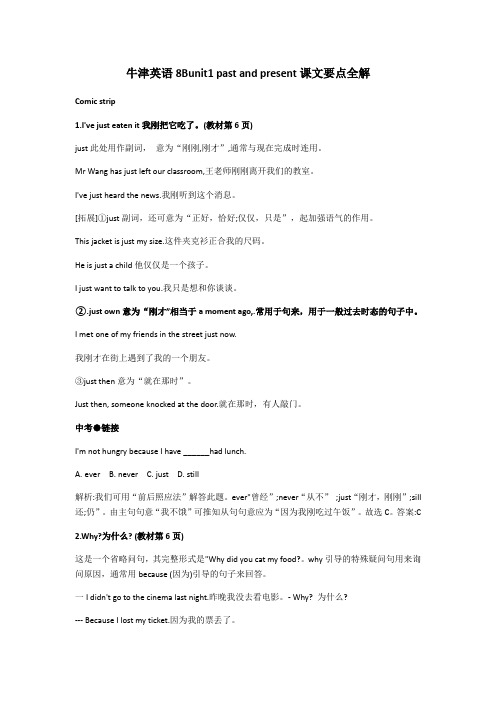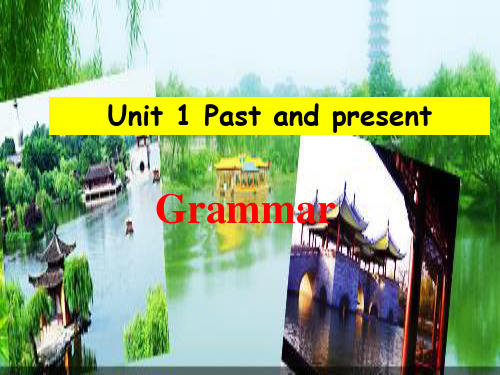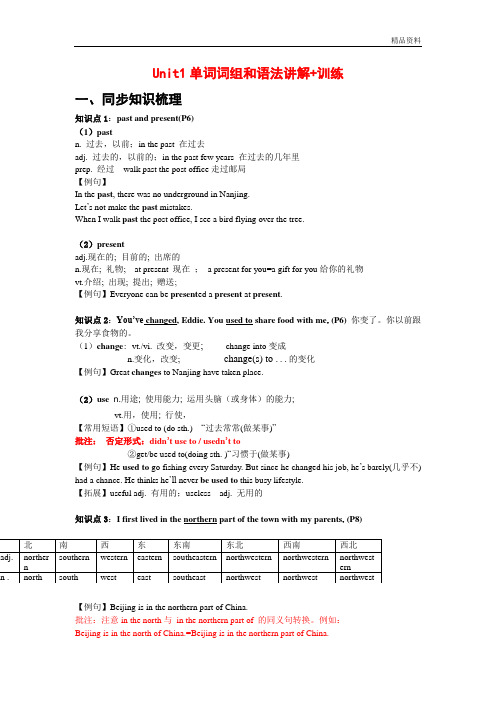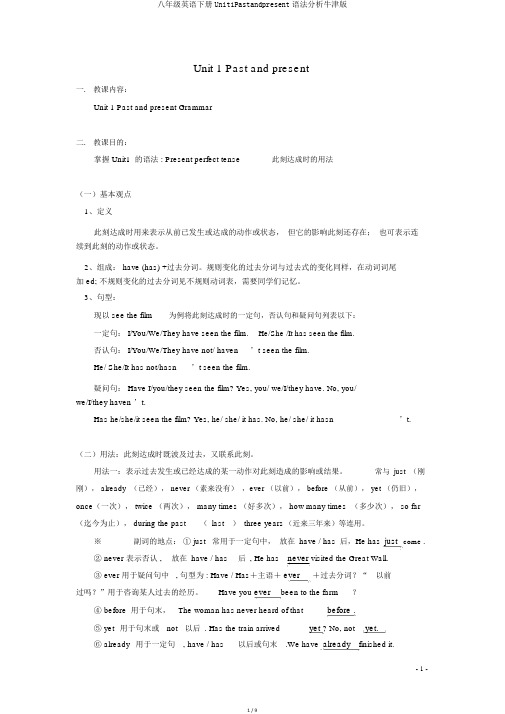八年级英语Past and present
江苏新教材牛津英语八年级下 Unit1 Past and present Welcome to the unit

Listen and answer
1. Does Hobo think Eddie has changed? Why? Yes. Because he used to share food with him.
Listen and answer
2. What was in the bowl an hour ago? Hobo’s food .
2. 技能目标: 1)了解北京不同时代的交通工具。 2)谈论自己、家人和朋友过去和现在使用的 不同交通工具。 3)初步认识现在完成时。 3. 情感目标:通过交通方式的变化,了解并 体会北京的巨大变化。
Lead-in
Happy New Year, boys and girls! We’re glad to be back at school again. You are one year older and you’re taller. All of you have changed.
Unit 1 Past and present Welcome to the unit
1.知识目标: 学习词汇:past , present, just 学习词组: used to do sth, Share sth with sb, go to school, by bike, take a bus 学习句子: You used to share food with me! It took a long time to wait for the next one.
Homework 1. Recite the sentences of the comic pictures. 2. 翻译下列词组 1)在碗中 2)过去常常 3)和……一起分享 4)家乡 5)在不同的时代 6)在过去的二十年中 7)北京的变化 8)一项历史项目
牛津译林版八年级英语下册8Bunit1 past and present 课文要点全解

牛津英语8Bunit1 past and present课文要点全解Comic strip1.I've just eaten it我刚把它吃了。
(教材第6页)just此处用作副词,意为“刚刚,刚才”,通常与现在完成时连用。
Mr Wang has just left our classroom,王老师刚刚离开我们的教室。
I've just heard the news.我刚听到这个消息。
[拓展]①just副词,还可意为“正好,恰好;仅仅,只是”,起加强语气的作用。
This jacket is just my size.这件夹克衫正合我的尺码。
He is just a child他仅仅是一个孩子。
I just want to talk to you.我只是想和你谈谈。
②.just own意为“刚才”相当于a moment ago,.常用于句来,用于一般过去时态的句子中。
I met one of my friends in the street just now.我刚才在街上遇到了我的一个朋友。
③just then意为“就在那时”。
Just then, someone knocked at the door.就在那时,有人敲门。
中考●链接I'm not hungry because I have ______had lunch.A.everB. neverC. justD. still解析:我们可用“前后照应法”解答此题。
ever"曾经”;never“从不”;just“刚才,刚刚”;sill 还;仍”。
由主句句意“我不饿”可推知从句句意应为“因为我刚吃过午饭”。
故选C。
答案:C2.Why?为什么? (教材第6页)这是一个省略问句,其完整形式是"Why did you cat my food?。
why引导的特殊疑问句用来询问原因,通常用because (因为)引导的句子来回答。
八年级英语下册 Unit 1 Past and present重点语法和句型 牛津版

Unit 1 Past and present一. 教学内容:Unit 1 Past and presentwords, phrases and sentences二. 教学目标:掌握Unit 1的词汇及词性变化和课文中的重点词组、句型的结构和用法Unit 1 Past and present(一)基础词汇过去,往事 past目前,现在 present(n. 现在,通常与过去、将来相对应。
The past, the present and the future . 过去、现在和将来。
at present. 此刻、现在: I’m afraid I can’t help you just at present. ----- I’m too busy. 很抱歉,我现在帮不了你,----- 实在太忙了。
adj. 现在的。
the present day当今、现今。
Most young people enjoy listening to popular music the present day. )刚刚 just(just, adv. 刚才。
常用于完成时态,在美式英语中用于一般过去时。
)I have just seen John. 我刚才见到约翰了。
I just saw him. (a moment ago). ( U. S)我(几分钟前)看到他的。
( U. S)自……以来 since(since. 后面通常接点时间来表示一段时间。
例如:since 1984 自从1984年一直到现在。
since 3 days ago. 自从三天前一直到现在,也可以说成for 3 days 通常用how long 提问。
How long has your uncle lived here? Since 1980. )南方的 southern到……时 till已婚的 married(marry. vt. vi marry sb. 与某人结婚;嫁或娶某人。
江苏新教材牛津英语八年级下 Unit1 Past and present Grammar

More practice
hasn’t finished (not finish) the 1. He ______________
homework yet. He will try to finish it
quickly. 2. My family ________ has lived (live) in Nanjing since 1996. 3. _____ ______ (know) him since Have you known then?
over the past century. From this have learnt (learn) film, I (4)______________ more about Beijing’s past and
present. have heard Sandy: Oh, I think I (5)__________(hear) about the film. Do you plan to see it again? Millie: Yes, I’d like to.
7. My father went to Beijing two weeks haven’t seen (not see) him since ago. I____________ then. 8. ____ Has Tom _______ written (write) letters to you recently? 9. Jack’s mother isn’t at home. She ________ has gone (go) to the supermarket.
3. 现在完成时的一般疑问句
句型 Have/Has+主语+过去分词 Have you….? Yes, I have. No, I haven’t. Has he….? Yes, he has. No, he hasn’t.
八年级英语下册 Unit 1 Past and present语法点拨 牛津版

Unit 1 Past and present一、教学内容:Unit 1 Past and present Language points二、教学目标:掌握课文中的重点语言点及用法1. He used to live in Nanjing.他过去住在某某。
used to do something. 表示“过去常常做某事”be used to doing something表示“习惯于做某事”be used to do 表示“被用来做某事”,主语常常是物。
e.g. ①. I used to get up at 6 o’clock. But now I often get up at 7 o’clock.②. We are used to reading English very early in the morning.③. A knife is used to cut something.(1) My grandmother________ a history teacher in a middle school.(过去曾是)(2) ________ you ________in Beijing now?(习惯住在)(3) Mobile phones________ municate with other people. (被用来)2. We lived together until 1965 when I got married. 我们一起住直到1965年我结婚。
1) till ( prep& conj. 介词/连词) 和until类似,常用于口语中,但不可用在句首。
肯定句(谓语动词是延续性的)+ till… “到……为止”I will stay here till 6:00 p.m. then I will go.否定句not(谓语动词是短暂性的)+ till… “直到……才……”He didn’t leave till it rained heavily.句首只能用untilUntil he returns, I can do nothing.他不回来,我什么也不能做。
2020年牛津译林版八年级英语下册Unit1单词词组和语法讲解+训练

Unit1单词词组和语法讲解+训练一、同步知识梳理知识点1:past and present(P6)(1)pastn. 过去,以前;in the past 在过去adj. 过去的,以前的;in the past few years 在过去的几年里 prep. 经过 walk past the post office 走过邮局 【例句】In the past , there was no underground in Nanjing. Let ’s not make the past mistakes.When I walk past the post office, I see a bird flying over the tree.(2)presentadj.现在的; 目前的; 出席的n.现在; 礼物; at present 现在 ; a present for you=a gift for you 给你的礼物 vt.介绍; 出现; 提出; 赠送;【例句】Everyone can be present ed a present at present .知识点2:You’ve changed, Eddie. You used to share food with me .(P6) 你变了。
你以前跟我分享食物的。
(1)change : vt./vi. 改变,变更; change into 变成 n.变化,改变; change(s) to ...的变化 【例句】Great changes to Nanjing have taken place.(2)use n.用途; 使用能力; 运用头脑(或身体)的能力;vt.用,使用; 行使,【常用短语】①used to (do sth.) “过去常常(做某事)” 批注: 否定形式:didn ’t use to / usedn ’t to②get/be used to(doing sth. )“习惯于(做某事)【例句】He used to go fishing every Saturday. But since he changed his job, he ’s barely(几乎不) had a chance. He thinks he ’ll never be used to this busy lifestyle. 【拓展】useful adj. 有用的;useless adj. 无用的知识点3:I first lived in the northern part of the town with my parents .(P8)【例句】Beijing is in the northern part of China.批注:注意in the north 与 in the northern part of 的同义句转换。
八年级英语下册Unit1Pastandpresent语法解析牛津版

Unit 1 Past and present一.教课内容:Unit 1 Past and present Grammar二.教课目的:掌握 Unit1 的语法 : Present perfect tense此刻达成时的用法(一)基本观点1、定义此刻达成时用来表示从前已发生或达成的动作或状态,但它的影响此刻还存在;也可表示连续到此刻的动作或状态。
2、组成: have (has) +过去分词。
规则变化的过去分词与过去式的变化同样,在动词词尾加 ed; 不规则变化的过去分词见不规则动词表,需要同学们记忆。
3、句型:现以 see the film为例将此刻达成时的一定句,否认句和疑问句列表以下:一定句: I/You/We/They have seen the film.He/She /It has seen the film.否认句: I/You/We/They have not/ haven’t seen the film.He/ She/It has not/hasn’t seen the film.疑问句: Have I/you/they seen the film? Yes, you/ we/I/they have. No, you/we/I/they haven ’t.Has he/she/it seen the film? Yes, he/ she/ it has. No, he/ she/ it hasn’t.(二)用法:此刻达成时既波及过去,又联系此刻。
用法一:表示过去发生或已经达成的某一动作对此刻造成的影响或结果。
常与just(刚刚), already (已经), never (素来没有),ever (以前), before (从前), yet (仍旧),once(一次), twice (两次), many times (好多次), how many times (多少次), so far (迄今为止), during the past(last)three years(近来三年来)等连用。
Units 1-8重要短语归纳2022-2023学年牛津译林版英语八年级下册

Unit 1 Past and presentWelcome to the unit1. past and present 过去和现在2. in the bowl 在碗里3. an hour ago 一小时前4. —Have you seen my food? 你见过我的食物吗?—Yes, I’ve just eaten it. 是的,我刚把它吃了。
5. used to share food with me 过去常常和我分享食物6. be so kind to me 对我那么好7. transport at different times 不同时代的交通工具8. by bike/ bus/ underground/ car/ taxi/ coach/ train/ plane骑自行车/乘公交车/地铁/汽车/出租车/长途汽车/火车/飞机9. Why didn’t you take a bus? 你为什么不乘公交车呢?10. too many people 太多人11. It took a long time to wait for the next bus. 花费很长时间等到下一班公交车。
12. It’s easy and fast (to go to school by bus). (乘公交车去上学)既简便又快捷。
Reading1. I’ve lived here since I was born. 我自出生就住在这里。
2. move house 搬家3. in the northern part of town 在城镇的北部4. get married 结婚5. move two blocks away 搬离两个街区6. We’ve lived in this area since then. 从那时起我们就住在这个地区了。
7. over the years 在这几年中8. turn part of the town centre into a new park 将镇中心的部分变为一个新公园9. a steel factory 一个钢厂10. put the waste into the river 将废物投入河中11. realize the problem 意识到这个问题12. take action to improve the situation 采取措施改善情况13. in some ways 在某种程度上14. move away 搬离15. know little about… 对……知道很少know nothing about…对……一无所知16. It has become impossible for us to see each other as often as before.我们已经不可能像以前那样经常见到彼此了。
- 1、下载文档前请自行甄别文档内容的完整性,平台不提供额外的编辑、内容补充、找答案等附加服务。
- 2、"仅部分预览"的文档,不可在线预览部分如存在完整性等问题,可反馈申请退款(可完整预览的文档不适用该条件!)。
- 3、如文档侵犯您的权益,请联系客服反馈,我们会尽快为您处理(人工客服工作时间:9:00-18:30)。
8B Unit 1 Past and presentGrammar 现在完成时现在完成时用来表示之前已发生或完成的动作或状态,但它的影响现在还存在;也可表示持续到现在的动作或状态。
其构成:have (has) +过去分词。
规则变化的过去分词与过去式的变化一样,在动词词尾加ed; 不规则变化的过去分词见不规则动词表,需要同学记忆。
现以see the film为例将现在完成时的肯定句,否定句和疑问句列表如下:肯定句:I/Y ou/We/They have seen the film. He/She /It has seen the film.否定句:I/Y ou/We/They have not/ haven’t seen the film.He/ She/It has not/hasn’t seen the film.疑问句:Have I/you/they seen the film? Yes, you/ we/I/they have. No, you/ we/I/they haven’t. Has he/she/it seen the film? Y es, he/ she/ it has. No, he/ she/ it hasn’t.二、用法:现在完成时既涉及过去,又联系现在。
用法一:表示过去发生或已经完成的某一动作对现在造成的影响或结果。
常与just(刚刚),already(已经),never(从来没有),ever(曾经),before(以前),yet(仍然),once(一次),twice(两次),many times(很多次),how many times(多少次),so far(迄今为止),during the past(last)three years(最近三年来)等连用。
※副词的位置:①just常用于肯定句中,放在have / has后,He has just come .②never表示否定, 放在have / has后, He has never visited the Great Wall.③ever用于疑问句中,句型为: Have / Has+主语+ever+过去分词?“…曾经……过吗?”用于询问某人过去的经历。
Have you ever been to the farm?④before用于句末,The woman has never heard of that before.⑤yet 用于句末或not 之后.Has the train arrived yet? No, not yet.⑥already用于肯定句, have / has 之后或句末.We have already finished it.⑦so far用于句首或句末. So far, we have visited the moon.用法二:表示过去已经开始,一直延续到现在的动作或状态。
时间状语有:①for+表示一段时间的词语I have taught English for 19 years。
②since+表示过去时间点的词语He has been at this school since 1986.③since+表示过去的时间状语从句I have lived here since I was born.④since+一段时间+ago. I have known him since 20 years ago.三、现在完成时态中可以和表示一段时间状语(for,since,how long, all one’s li fe)连用的动词必须是表示延续的情况或动作的动词,即延续性动词。
如:be,have,know,live,work,study,learn,teach,keep,speak,talk,draw,wait,wear,walk,sleep,drive,write,do,clean等。
I have been a teacher for nearly 20 years. How long has he lived here?四、延续性动词的现在完成时可和包括“现在”在内的(到说话时仍未结束)表示一段时间的状语连用。
如this morning,today,this week,these daysHe has been to Beijing three times this year. He has written two letters this morning.(说话时间在上午)He wrote two letters this morning.(说话时间在下午或晚上)五、英语中还有一些动词的意义决定它们所表示的动作不能延续,只是一瞬间就结束的动作,这类动词叫做“非延续性动词”,常见的有:come,go,arrive,reach,see,hear,close,open,leave,begin,start,lose,buy,fall,join,die,get up,become,borrow,lend,find,finish,receive等。
这些动词可用于现在完成时,说明某个动作的结果还存在,但不能和表示一段时间的状语(how long,for,since)连用。
He has come back.(√)He has come back for two hours.(×)※但在否定句中,非延续性动词也可用表示一段时间的状语来修饰,如I haven’t heard from my father for a long time. We haven’t seen him since 1999.六、当终止性动词(非延续性动词)与表示一段时间的状语(how long,since,for,all one’slife)相矛盾时,改正错句的方法有如下几种:(1)用副词ago把现在完成时的句子改为一般过去时.He has come back for two weeks.(错)改为:He came back two weeks ago.(正)I have lost my bike for ten days. (错)改为:I lost my bike ten days ago. (正)(2)用“It is / has been+时间+since+一般过去时态”句型来改写。
He has joined the League for 3 years. (错)It is 3 years since he joined the League.I have bought the book for 5 days. (错)It is 5 days since I bought the book. (正)He has died for 20 years. (错)It is 20 years since he died. (正)(3)用“时间+has passed+since+一般过去时态”句型来改写。
He has left home for 20 years. 改为:Twenty years has passed since he left home.He has lost his pen for 2 days. 改为:Two days has passed since he lost his pen.(4)用系表结构来改写.He has died for 20 years. 改为: He has been dead for 20 years.The factory has opened since 1999. 改为:The factory has been open since 1999.How long has he left? 改为:How long has he been away?(5)用相应的延续性动词替代非延续性动词。
H e has bought the book for two weeks. 改为:He has had the book for two weeks.常见的相应转换形式如下:borrow / lend→keep, buy→have, finish / end→be over, arrive /come / go / move / reach /get to →be in /at / be here /be there, begin / start→be on , open→be open , close→be closed, die→be dead , leave→be away(from),go to school→be in school / be a student, get up→be up, fall asleep→be asleep , fall ill→be ill, get to know→know, lose→be lost, become→be, return / come back / get back→be back, join→be in / be a…member, join the army→be in the army /be a soldier, receive / get a letter→have a letter , catch / get a cold→have a cold, begin to study→study,他参军已有三年.He has joined the army for three years.(错)改为:He has been in the army for three years / since three years ago.He has been a soldier for three years / since three years ago.He joined the army three years ago.It is three years since he joined the army.Three years has passed since he joined the army.(1)He came to our village two years ago.=He our village since two years ago.(2)He left home three days ago=He home for 3 days.(3)I bought the watch 2 weeks ago=I the watch since 2 weeks ago.(4)It is 5 days since I borrowed the book=I the book for 5 days.(5)The film has begun= The film for half an hour.(6)I got to know him 10 years ago=I him for 10 years.(7)There is a factory=There a factory for 20 years.(8)Our school opened in 1960=Our school since 1960.七、现在完成时中应注意的几个问题1. have been to 和have gone to的区别have been to 强调“去过”,现已不在那里,如:He has been to the USA three times.他到美国去过三次。
